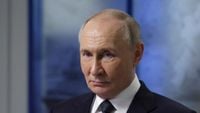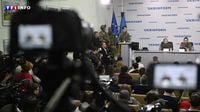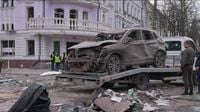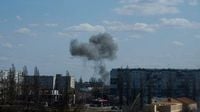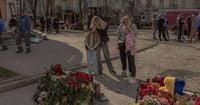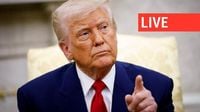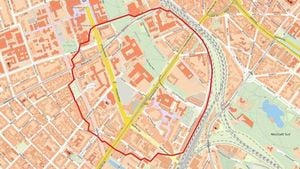In a devastating attack on the Ukrainian city of Soumy, at least 35 people, including two children, were killed on Sunday, April 13, 2025, when two Russian ballistic missiles struck the center of the town, which lies approximately 30 kilometers from the Russian border. This tragic incident occurred around 10:15 AM, coinciding with many locals attending church services for Palm Sunday. The assault not only claimed lives but also left 119 individuals injured.
As the missiles hit, chaos ensued in the bustling area, which was filled with civilians. Oleg Strilka, a spokesperson for the regional emergency service, described the scene, stating, "It's the center of the city, the central part, and Sunday was a major religious holiday. There are religious buildings on both sides of the street where the bombing occurred. People were going to worship, so there were many injuries." Strilka noted that numerous bodies lay in the streets, highlighting the horrific aftermath of the attack.
Emergency teams worked tirelessly to clear debris and extinguish fires caused by the explosions. Residents began to gather, laying flowers at makeshift memorials for the victims, as the community grappled with the profound grief of losing loved ones.
This missile strike is the second major attack resulting in civilian casualties within a week, following a deadly missile strike on Kryvyi Rih, the hometown of Ukrainian President Volodymyr Zelensky, which occurred on April 4, 2025, and killed around 20 individuals, including nine children.
The international community responded with outrage and condemnation. Lithuanian Foreign Minister Kestutis Budrys labeled the attack a war crime, asserting that Russia employed cluster munitions that indiscriminately target civilians. He stated, "These [weapons] disperse submunitions or small bombs randomly over a wide area, posing an immediate threat to civilians," as reported by Human Rights Watch.
Polish Foreign Minister Radek Sikorski suggested that the attack was a direct response to a ceasefire proposal made by the United States over a month ago, expressing concern that Russia was disregarding diplomatic efforts. "I hope that President Trump and the American administration will see that Russia is mocking their goodwill, and I hope the right decisions will be made," Sikorski remarked.
Finnish Foreign Minister Elina Valtonen echoed these sentiments, emphasizing that the strike came just after U.S. envoy Steve Witkoff met with Russian President Vladimir Putin in St. Petersburg. Valtonen criticized Russia for showing total disregard for the peace process and human life.
Friedrich Merz, the designated Chancellor of Germany, condemned the Soumy attack as a grave war crime and reiterated previous calls for supplying long-range Taurus cruise missiles to Ukraine, which were previously denied by outgoing Chancellor Olaf Scholz. Merz emphasized the need for the Ukrainian military to gain the upper hand in the ongoing conflict.
French officials also weighed in, with Foreign Minister Jean-Noël Barrot asserting that the attack underscored Putin's unwillingness to accept a ceasefire. Barrot called on the European Union to impose severe sanctions against Russia to cripple its economy and hinder its war efforts. The EU has already implemented 16 rounds of sanctions against Russia and is working on a 17th, though reaching consensus has become increasingly difficult due to the impact on European economies.
President Zelensky welcomed the international reaction but urged for increased pressure on Moscow to end the war. In his nightly address on April 14, 2025, he stated, "Only real pressure on Russia can end this situation. We need tangible sanctions against the sectors that finance the Russian killing machine," as he expressed his frustration over the ongoing violence.
In a stark contrast to the international condemnation, Russian Foreign Minister Sergei Lavrov claimed that the missiles targeted Ukrainian military commanders and their Western allies in Soumy, accusing Kyiv of using civilians as human shields. The Russian Ministry of Defense further asserted that the attack resulted in the deaths of over 60 soldiers, although no evidence was provided to substantiate this claim.
Amid the chaos, accounts from survivors paint a grim picture of the day. Volodymyr Boyko, a 69-year-old resident, recounted the moment the missiles struck. "I heard the first explosion, then a second. Everything was falling and flying towards us. I instinctively crouched down," he recalled, his face marred by shrapnel wounds. Another survivor, 13-year-old Kirillo Illiashenko, helped others escape from a bus that became trapped in the chaos.
U.S. President Donald Trump described the bombing as "horrible" but refrained from directly blaming Russia. He stated, "I think it's terrible. And I was told they made a mistake. But I think it's a horrible thing." The U.S. National Security Council emphasized that the bombing highlights the urgent need for negotiations to end the conflict.
As the people of Soumy mourn their losses, the attack serves as a stark reminder of the ongoing violence and the complexities of international responses to the war. The situation remains fluid, with continued discussions on how to address the humanitarian crisis and the geopolitical implications of the conflict.
The bombing of Soumy is not just a tragic event; it represents a broader narrative of suffering and resilience in Ukraine. As the country continues to face these challenges, the international community watches closely, hoping for a resolution that honors the lives lost and seeks to prevent further tragedy.
